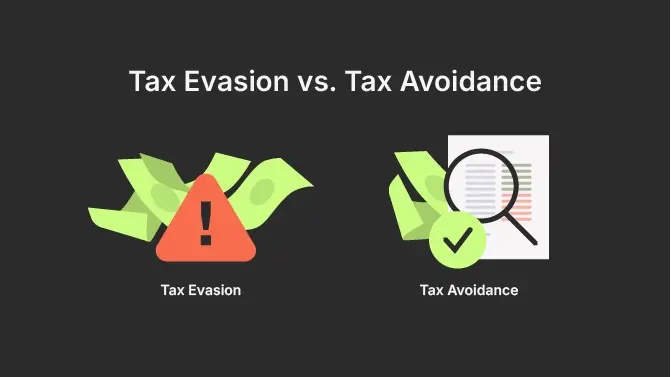For many, paying taxes is a source of frustration, a seemingly endless drain on hard-earned income. It’s a sentiment that has given rise to a global industry of tax professionals and financial advisors dedicated to helping individuals and businesses minimize their tax liabilities. But in the quest to reduce what’s owed, there’s a critical distinction to be made—one that separates strategic financial planning from a criminal act.
This distinction lies between two concepts that are often confused but are fundamentally different: tax avoidance and tax evasion. While both aim to lower one’s tax burden, one is a perfectly legal and legitimate practice, leveraging the rules as they are written, while the other is a fraudulent and illegal offense with severe consequences. Understanding this difference is not just an academic exercise; it’s essential for anyone seeking to manage their finances responsibly and stay on the right side of the law.
The Principle of Tax Avoidance: Playing by the Rules
At its core, tax avoidance is the legal use of the tax regime to one’s own advantage to reduce the amount of tax that is payable. It involves taking deliberate steps, permitted by law, to structure your financial affairs in a way that minimizes your tax liability. Think of it as using a coupon at a grocery store; the store offers the discount, and you are simply taking advantage of a legitimate tool to reduce your total cost.
The foundation of tax avoidance is the tax code itself. Governments create laws that include numerous deductions, credits, exemptions, and deferral mechanisms. These provisions are not loopholes in the pejorative sense but rather intentional incentives to encourage certain behaviors, such as saving for retirement, donating to charity, or investing in specific sectors.
For individuals, common forms of tax avoidance include:
- Contributing to tax-advantaged retirement accounts like a 401(k) or IRA, which allows you to defer taxes on a portion of your income until retirement.
- Claiming deductions for things like mortgage interest, state and local taxes, or charitable donations, which lowers your taxable income.
- Utilizing tax-loss harvesting, a strategy where investors sell losing investments to offset gains and reduce capital gains tax.
- Using tax-free savings accounts for education or health expenses, which allows the money to grow and be withdrawn tax-free under certain conditions.
For corporations, tax avoidance can be more complex and often involves international strategies. This can include:
- Structuring operations to take advantage of favorable tax treaties between countries.
- Locating headquarters or subsidiaries in jurisdictions with lower corporate tax rates.
- Using transfer pricing—the method companies use to price transactions between their subsidiaries—to shift profits from a high-tax jurisdiction to a low-tax one.
While these practices are legal, they can sometimes push the boundaries of what is considered ethical. “Aggressive tax planning” often falls into a grey area, where a company may be following the letter of the law but subverting its spirit. This ethical debate, however, does not change the fact that these actions, by definition, remain within the legal framework.
The Peril of Tax Evasion: A Criminal Offense
In stark contrast to avoidance, tax evasion is the illegal non-payment or underpayment of tax. It is a criminal act characterized by deceit, concealment, and the deliberate misrepresentation of financial information. Evasion is not about using the rules; it’s about breaking them through fraudulent means to avoid a legal tax obligation.
The intent behind evasion is to hide income, assets, or taxable events from the tax authorities. It is a calculated scheme to defraud the government and the public services that taxes fund.
Examples of tax evasion are clear and unequivocal:
- Underreporting income from a job or business, such as taking cash payments and not reporting them.
- Failing to file a tax return when you are required to do so.
- Hiding assets or income in undisclosed offshore bank accounts.
- Creating false or fraudulent deductions and expenses that were never incurred.
- Forging documents or receipts to support fraudulent claims.
The consequences of tax evasion are severe and multi-faceted. On the financial side, offenders face significant penalties, which can include hefty fines that often far exceed the original tax amount owed. The government will also seek to recover the unpaid back taxes, along with substantial interest.
Beyond the financial penalties, tax evasion carries serious legal repercussions. Depending on the amount of tax evaded and the jurisdiction, it can lead to criminal charges, including imprisonment. The damage extends beyond legal and financial penalties, often resulting in irreparable harm to one’s reputation and the potential loss of professional licenses or career opportunities. For a business, a conviction for tax evasion can destroy public trust and lead to the company’s collapse.
Drawing the Line: A Simple Guide
The fundamental difference between tax avoidance and tax evasion can be distilled into a single question: Is the action you’re taking legal?
- Tax avoidance is strategic and transparent. You are using the explicit provisions of the law to your benefit. While tax authorities may challenge aggressive interpretations of the law, the underlying actions are not fraudulent.
- Tax evasion is fraudulent and secretive. It involves lying, hiding, or fabricating information to illegally escape a tax obligation.
Think of it this way: claiming a deduction for a legitimate charitable donation is tax avoidance. Fabricating a receipt for a donation you never made is tax evasion. Contributing to a 401(k) to lower your taxable income is avoidance. Getting paid in cash and not reporting the income is evasion.
For individuals and businesses alike, the safest and most responsible approach is to consult with a qualified tax professional. The tax code is incredibly complex, and a professional can help you navigate its intricacies to find legitimate ways to minimize your tax burden. They can ensure you are leveraging every available benefit without crossing the critical line from legal planning into a criminal act.
Ultimately, the choice is clear. Tax avoidance is about playing the game well, using the rules to your advantage. Tax evasion, on the other hand, is about cheating. While the desire to save money is universal, it is crucial to remember that one path leads to smart financial management, while the other leads to fines, penalties, and even prison.


